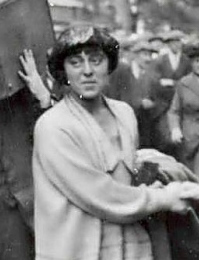
I wish the Government joy in its efforts to get this money from the people of Poplar. Poplar will pay its share of London's rates when Westminster, Kensington, and the City do the same.
Minnie Lansbury was born in Stepney in 1889, one of seven children in a Jewish family who came to London to escape poverty and persecution in Russia. Her father, Isaac Glassman, was originally a boot finisher but later became a coal merchant. In 1913, Isaac paid the £5 fee to become a British citizen, entitled to vote. In 1914 Minnie married Edgar Lansbury, son of local MP George Lansbury.
Minnie became a teacher in a local London County Council school, earning £7 a month. She joined the National Union of Teachers and became involved in union activism, calling for equal pay for women among other things. She also joined the central committee of the East London Federation of the Suffragettes and played a key role in their campaigns and community actions. During the First World War Minnie became chair of the War Pensions Committee and used her role to protect the welfare of war widows, orphans, and the wounded.
After the War Minnie was elected alderman on Poplar Council. In 1921, she was one of five women who, along with their male colleagues, were sent to prison for refusing to charge full rates from their poor constituents. Although the Poplar Rates Rebellion was a success, while in prison Minnie caught pneumonia and never fully recovered her health.
On 1 January 1922 she died, aged just 32. Her death was announced at a thousand-strong meeting at Bow Baths Hall: "The audience for a moment was stricken silent... Then out of the silence came a woman's cry of grief, followed by the weeping of many women." The meeting was abandoned.
A few days later a crowd of thousands of mourners, mostly women, stood in the streets as her coffin passed by. George Lansbury wrote a moving tribute to his daughter-in-law in the Daily Herald:
Minnie, in her 32 years, crammed double that number of years' work compared with what many of us are able to accomplish. Her glory lies in the fact that with all her gifts and talents one thought dominated her whole being night and day: How shall we help the poor, the weak, the fallen, weary and heavy-laden, to help themselves? When, a soldier like Minnie passes on, it only means their presence is withdrawn, their life and work remaining an inspiration and a call to us each to close the ranks and continue our march breast forward.
Sources





